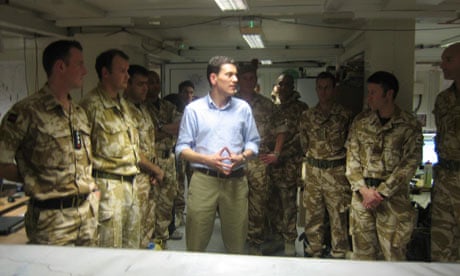For the past three days, I've been travelling with David Miliband in Afghanistan, as the foreign secretary has sought to prepare the way for the London Conference on January 28.
The Miliband trip started in Helmand province, where there was an unusual supply of upbeat news. Poppy cultivation is down by a third, and 40,000 of Helmand's farmers have taken up the provincial government's offer of subsidised wheat seed instead.
Meanwhile, many of Helmand's district centres that were no-go areas until very recently are now relatively quiet. Lashkar Gah, the provincial capital, has not suffered a serious attack in months and the streets are full of bustle and commerce.
The province-wide improvement has a lot to do with the arrival of large numbers of US marines. The total is expected to reach 20,000 by spring, compared to the 9,500-strong British garrison. The Americans are much better equipped than their British counterparts (the 'Lash' base used to be fairly quiet at night. It now positively vibrates from the constant to and fro of US helicopters on night operations). Marine officers also have much more walking-around money to give out, to create instant employment in the villages.
The big question is whether Helmand's unaccustomed good news will last beyond the US surge, when the marines go home taking their money with them. A lot depends on whether the Afghan government will be able to fill the gap, and on this score the Kabul leg of Miliband's trip was mixed at best.
While the foreign secretary was in town, Pakistan's parliament rejected ten out on Hamid Karzai's 17 ministerial nominees on Saturday, further delaying the formation of a complete government. Miliband, however, was able to point out that the most important portfolios - interior, defence, foreign and finance, had been confirmed in the hands of "high quality" officials, and that the parliamentary vote was proof of a vigorous democracy.
More troubling was one of the handful of nominees parliament did confirm. Zarar Ahmed Moqbel once ran the interior ministry until about a year ago when Karzai was forced to sack him amid international uproar over his department's culture of corruption and incompetence. He will now lead the Afghan counter-narcotics effort, giving a new opiate twist to the old saying about foxes and henhouses.
When Moqbel was nominated, a British former law and order official described the interior ministry under his control as "a byword for corruption and incompetence".
This is particularly awkward for Britain. It is the 'lead' Nato nation on counter-narcotics, and Gordon Brown has pledged to turn off the tap on funding to Afghan institutions that fail to get a grip on graft. Asked whether that meant there would be no more British money for the counter-narcotics ministry, Miliband provided a carefully hedged answer.
We will look at every ministry and make sure that any support or engagement or funding we provide is going to be used for the uses intended, and that is for the benefit of the people of Afghanistan... Obviously counter-narcotics is important and we will liaise very closely with our allies, but British people should be assured their money isn't going to any uses it was not intended for.
In practice, Britain and other donors can work around Moqbel's new ministry which has become less central to the overall counter-narcotics effort. More money now goes through the agriculture ministry on crop substitution programmes. But it is hardly the image Karzai's international backers want him to portray at the London Conference, where the whole international venture in Afghanistan will once again be weighed against the lives and resources being spent there.

Comments (…)
Sign in or create your Guardian account to join the discussion